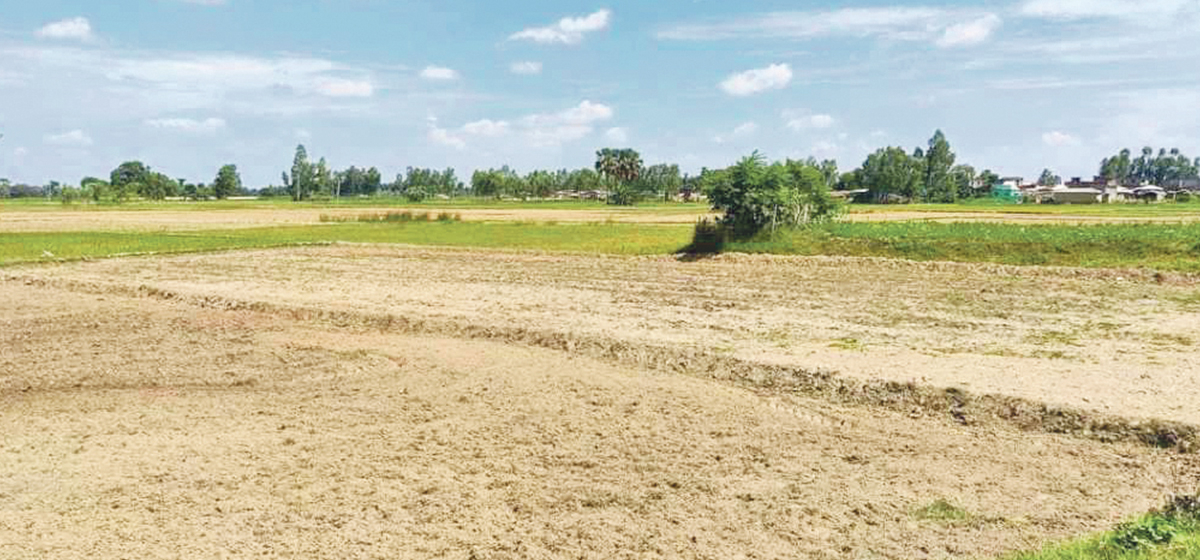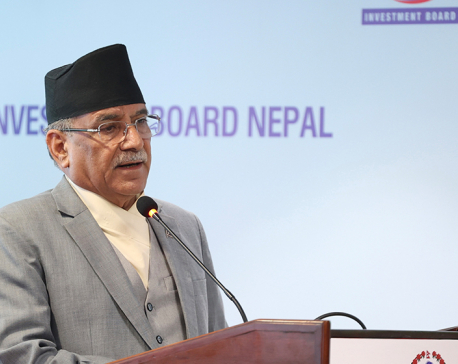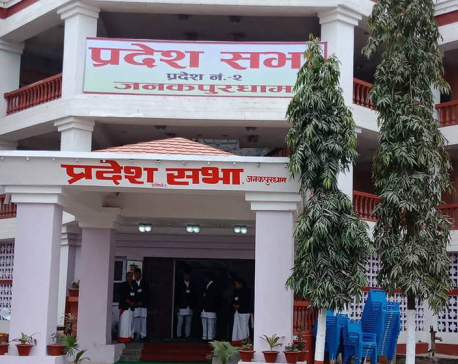
OR
Farmers in Madhesh suffer from the lack of irrigation, fertilizers
Published On: July 18, 2022 05:10 PM NPT By: Republica | @RepublicaNepal

JANAKPURDHAM, July 18: Agriculture is considered the main basis of prosperity of Madhesh Province. The provincial government has been emphasizing a commercial agriculture system to increase agriculture, irrigation and agricultural production to make the province prosperous. But during the paddy planting season, the government has become a mute spectator when the farmers of Madhesh are without fertilizers and any means to irrigate their fields.
According to the Ministry of Agricultural Land Management and Cooperatives, 57 percent planting has been done in Madhesh Province so far. In Madhesh Province, where paddy is planted in a total area of 405,045 hectares, paddy has been planted only on 229,167 hectares i.e. 57 percent of the total arable area so far. In this province, 75 percent plantation in Saptari, 55 percent in Siraha, 60 percent in Dhanusha, 45 percent in Mahottari, 55 percent in Sarlahi, 50 percent in Rautahat, 60 percent in Bara and 42 percent in Parsa have been completed. The areas of plantation would have increased if there had been enough fertilizers and rain. According to Sunil Kumar Singh, head of Soil and Fertilizer Testing Laboratory of Madhesh Province, the main reason for the shrinking of the planted area is the lack of fertilizers and irrigation.
Now the paddy fields planted by the farmers have started to dry up due to the lack of irrigation. Singh says, "If the conditions of fertilizer and irrigation remain the same, not only the planting will decrease in Madhesh Province, but also the production will decrease." Earlier, farmers used to plant multiple crops when there were adequate irrigation facilities and timely rains. Later, when fertilizers and rainfall were uncertain, farmers were limited to wheat and paddy crops. Singh said that although the stock of fertilizers with the government-owned supply company was small, it could not be distributed to the farmers.
Manish Kumar Pal, information officer for the Ministry of Agricultural Land Management and Cooperatives, said that the planting area has shrunk due to the lack of rain at the time of planting and fertilizers not being available at the time.
Shrinking agricultural sector
Raslal Yadav, 82, from Bariyarpatti, a rural area in the south of Siraha, does not have much hope from the government. Farmers have only one expectation from the government, that is irrigation and fertilizers. If there is a reliable system of irrigation, he has a dream to change the barren land into a garden of food grains. He has a desire to increase the crop production and earn a good income if there is a fertilizer system. But neither the demand for irrigation nor fertilizer has been met, leaving him disappointed.
In the past, the farmers of this region would bring in enough paddy, wheat, pulses, mustard and grams in the harvesting season. Later, the tradition of cultivating grams and mustard also dried up. Now, only paddy and wheat are cultivated. He says that the tradition of cultivating paddy and wheat, too, is slowly drying up. That is, within the last few decades, the tradition of multiple crops has dried up. Now, they have to buy food grains.
Dashani Sadaya (Musahar) of Golbazar-10 narrates the pain of being unemployed for 10 months in a year. Her suffering meant that she would be employed throughout the year in the past when farmers were practicing multiple crops farming. “Now, apart from planting and harvesting paddy, I have to remain unemployed for 10 months,” she said. Her employment has narrowed down to rice farming. As the agricultural tradition of Madhesh has narrowed down from multi-crop to single crop, agricultural workers dependent on farming have become unemployed. Some male laborers have gone to the Gulf and India in search of work. The men living at home are working as laborers loading gravel, sand and stones on tractors. They work in the river to collect riverbed products.
Farmer Raslal Yadav pointed to the scene of rice imported from the border being loaded on a Nepali truck at the border of Bariyarpatti and said, “As early as two decades ago, I used to carry rice on bullock carts to Madhuvani in India.” Dorik Yadav, 80, another farmer living near Raslal, said, "Time has reversed," he said, "Those who sell food grains have become poor, those who buy have become rich.” The irrigation canal in Bariyarpatti-4 and the barrage in the Katnia River at Tenuwapatti have been left unattended and unused for years.
The plan is to irrigate the fields of the farmers in this area by harvesting water from Kamala River. However, even after more than five years, this plan is incomplete. “Through the irrigation system of Katania, the water of Kamala reaches our fields and the suffering of the farmers in this region is removed,” said farmer Dorik, linking the desertification of Madhesh with irrigation inconvenience, “The government did not invest to solve the problem of our bellies." He sneered at the fact that the government invested more in roads, beautification of ponds, and monasteries than in irrigation and fertilizers. In the absence of irrigation, no matter how much crops they plant, the farmers here are suffering from the lack of irrigation.
"Fertilizer is not easily available from the government," the farmers of this region expressed their common pain. "I watched for five years to see if the provincial government would apply ointment to the sores of the farmers," he said, "Even the state's attitude toward the farmers was not different from the central government." Since the first meeting of the provincial assembly, the members of the provincial assembly have been saying that agriculture is the basis of prosperity in Madhesh Province. Yadav said, "The fields will not thrive until the barren land of the rural Madhesh is watered. Madhesh Province will not be prosperous until the farmers prosper.”
Since the first meeting of the provincial assembly, the members have been emphasizing a commercial agriculture system to increase agriculture, irrigation and agricultural production to make the province prosperous. Yadav says that most of the funds received by the province assembly members under the constituency development program are being spent on concrete construction.
Ambitious goals, disappointing achievements
Only 24 percent of the total land in the country is arable. But Madhesh is such a province where about 69 percent of the land is arable. As much as 94 percent of agricultural land in Madhesh has moisture.
The mentioned facts are a strong basis for calling Madhesh a granary. On this basis, the province government is claiming to make this province an exporter of grain. On this basis, the Madhesh Province government has set a target of 7.9 percent economic growth in the agricultural sector by the financial year 2080/81.
In the first periodic plan, the economic growth rate of the agricultural sector was only 4.3 percent. The production value of the agricultural sector is targeted to reach Rs 221.27 billion by 2080/81. It was Rs 177.8 billion in the fiscal year 075/76. The goal of the provincial government is to increase the per capita food grain production to 206.63 kg by the fiscal year 080/81. In 2075/76, the per capita food grain production was 161.9 kg.
You May Like This

Special arrangement for Madhesh in upcoming budget: PM Dahal
KATHMANDU, Feb 24: Prime Minister Pushpa Kamal Dahal has said special arrangements would be made for the Madhesh Province in... Read More...

Monsoon rainfall predicted to be less than average this year
KATHMANDU, May 4: Less than average rainfall is predicted during the monsoon this year. According to the Department of Hydrology... Read More...

Madhesh Province Assembly meeting today
JANAKPUR, March 25: A meeting of the Madhesh Province Assembly is taking place at 2:00 pm today. ... Read More...





Just In
- MoHP cautions docs working in govt hospitals not to work in private ones
- Over 400,000 tourists visited Mustang by road last year
- 19 hydropower projects to be showcased at investment summit
- Global oil and gold prices surge as Israel retaliates against Iran
- Sajha Yatayat cancels CEO appointment process for lack of candidates
- Govt padlocks Nepal Scouts’ property illegally occupied by NC lawmaker Deepak Khadka
- FWEAN meets with President Paudel to solicit support for women entrepreneurship
- Koshi provincial assembly passes resolution motion calling for special session by majority votes






_20220508065243.jpg)






Leave A Comment